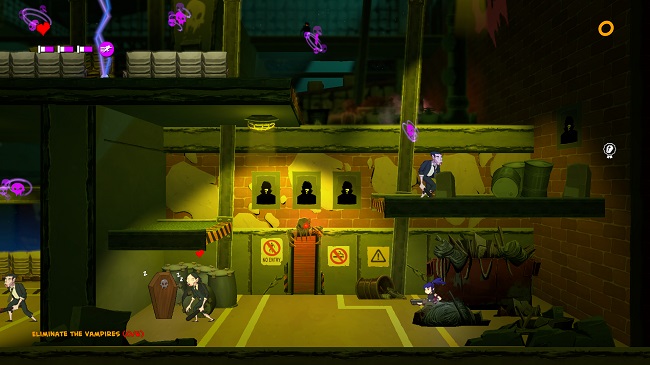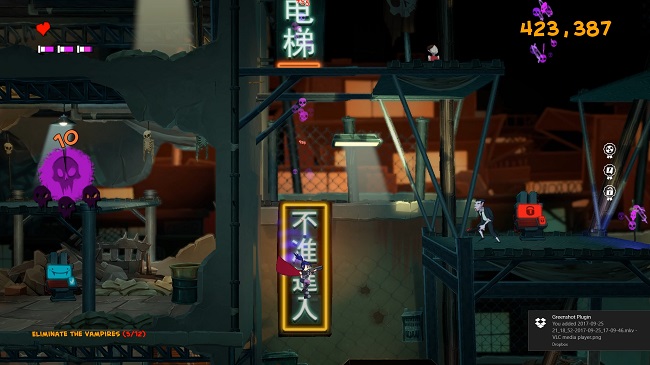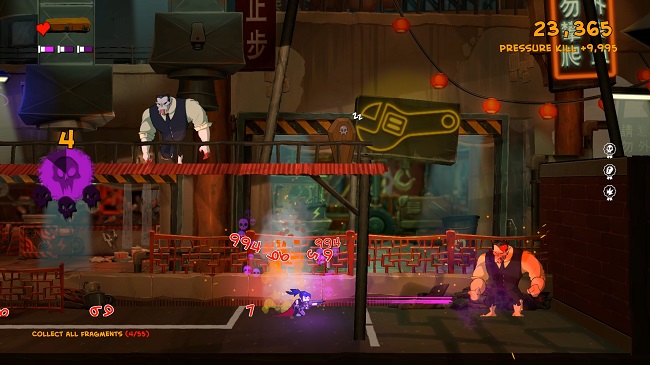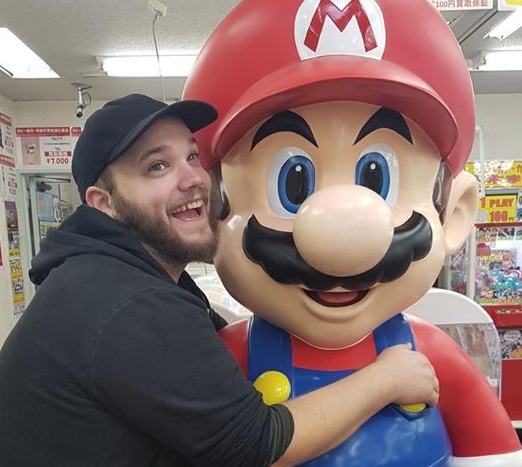
I have a real soft spot for Damsel, a game that feels as though it was made specifically to appeal to a fifteen year old version of myself. Platformer and Shoot ’em Up are two classic genres, and a mix of both feels like a natural fit for the titular Damsel; causing distress among vampires by shooting them in the face with a stake launcher. This is one of those games I’ve played as it’s changed over time, and Screwtape Studios’ Megan Summers was kind enough to lend me her ear for a few minutes to update me on what’s changed.
What I played feels different from last year, so what’s changed in that time?
We have a whole new game mode, so now we’ve got Arcade and Campaign. The Arcade mode is really based on speed running and getting through as many levels as possible but with only three lives. It’s still just as hard – they’re gonna hit you once and you’re gonna die! We’ve also been working with Samplify, so we finally got a full sound design. Not all of the sounds are in the game yet, but so far they’re complimenting our music perfectly. People might have noticed last year that the only sound effects we had were the shotgun and footsteps. So we’re really winding down to the last few months, making sure everything is polished, and we want to hit localisation for other languages as well.
What has been the biggest challenge during development of the game?
Our biggest challenge has been making sure our scope doesn’t exceed our resources or ability. We’ve got so many ideas that we want to throw into the game, and it can mean that the vision gets muddied a little, making the experience a little disjointed and messy for the player. Overcoming this has meant that we’ve learnt how to ask certain questions before getting something in the game. For example, “How is this feature justified in the narrative?”, “Does it add significant value?”, “Can it be used in multiple situations?”, “Does it diminish an existing feature?”, etc., etc.

What was your experience with Kickstarter like, and how has audience feedback influenced the game since?
The Kickstarter experience was good. We were tentative going in about hitting the goal from the beginning but have been able to build our fan community over the month. It was great meeting players and backers at PAX Aus. The audience feedback has helped us hone the competitive side of the game. Knowing people loved the competitive edge to the new Arcade Mode.
I think our biggest problem was that we gave to much, we showed that we were almost ready to release, and so there has been that little bit of, “Well, it’ll come out, so we don’t need to support it, right?” We maybe didn’t communicate just how much we did need it because we always have backup plans, as well. We didn’t want to go to Kickstarter as our final be-all-and-end-all, or that the game wasn’t going to make it if we didn’t get through. We know how hard it is as a full-time job. It has been amazing, though, having streamers come on and just giving their time, and we have had a streamer competition going with the top tiers of the Kickstarter as prizes.
With the game being so late into development, what were you hoping to get out of the Kickstarter?
We knew that we really needed help to build up our international community, developing in Australia is… It’s interesting. We’re in a different timezone, which always makes things hard, and Kickstarter is a really nice way to bring in a community of people who love indie games – it’s what they’re looking for. In turn, our community around the world has been building up, and we’ve found some new markets in places that we didn’t realise it would be popular with, so now we’re tring to make sure we can localise for those places.
We also know as an indie team that marketing a game at the very end is the biggest thing. We’ve spent almost three years working on the game, so the last thing you want is for no one to see it at the end because you get lost in the marketing. Unfortunately, it’s a new thing that every indie dev now has to think about, so it was part of our push for Kickstarter that we wanted to let more people know about our game.
So, even though you guys didn’t hit that monetary goal, you still think the Kickstarter helped a lot for getting support?
I do, I really do. It meant that we could actually have something to put out to press as we’re ramping up to the final six months. The biggest thing for me was finding new players and finding new places where we could show the game. I think if we’d shown a little less, we may have been more successful in the monetary sense, but, for us, the community that we’ve built – and knowing that people do really do want it – it’s been worth it.

What has changed since the last time we spoke about Damsel?
Since last year we’ve really spent a lot of time focusing on gameplay. We decided to remove the more intricate story we wanted to tell, which gave us more resources to devote to getting the feel of the game in a good place. We refined our combo system and worked on adding style points to encourage crazy, tense gameplay. We also spent quite a bit of time better connecting all of our mechanics into something a bit more elegant. You now have to think much more about your decisions and the ramifications of making them.
Were there any other influences that changed development as it progressed?
The biggest influence has been watching people play the game and making adjustments based on what we see. We never want players to ask the question “What do I do now?” so we’ve been trying to make sure that is never a problem. We’ve also spent a bit of time making sure the game is as fun to watch as it is to play. Damsel is a great game for streamers as there’s a lot of tension in the gameplay – this leads to some “salty streams” that viewers can find rather entertaining.
How long do you think it will be before development is complete, and what else needs to go into the game before you reach that point?
We’ve got another five or six months before we intend to release, and that time will be spent mostly polishing up the game and making small adjustments to the second-to-second gameplay. Then there’s all the extra goodies that we’ve planned as well – achievements, leaderboards, cloud saving, trading cards, plus a fair bit more.
What has your experience as an indie developer been like without the support of a publisher or third party?
It’s very much like being a garage band. The big guys spend a lot of time optimising for commercial appeal, but we can do something that is a little more raw and from the heart when we don’t have to deal with certain bureaucracies. We’re also small enough that we don’t need to ship a million units to be viable. We want to, though! – but it’s ok if we don’t.

What are the most significant lessons learned from developing this game?
Damsel has been in production for three years now, and there is no way we would have been able to continue working without loving the game we are making. I also hope anyone who wants to make one game wants to make a second, so make sure you have a business plan and know how you will run the business.
What advice would you offer to anyone trying to develop their own game?
Find amazing people to work with and bring people in that you want to learn from.
Here are some other places where you can show your support for Damsel:
Twitter: https://twitter.com/damselgame
IndieDB: http://www.indiedb.com/games/damsel
Website: http://www.damselgame.net/
Steam: https://steamcommunity.com/











